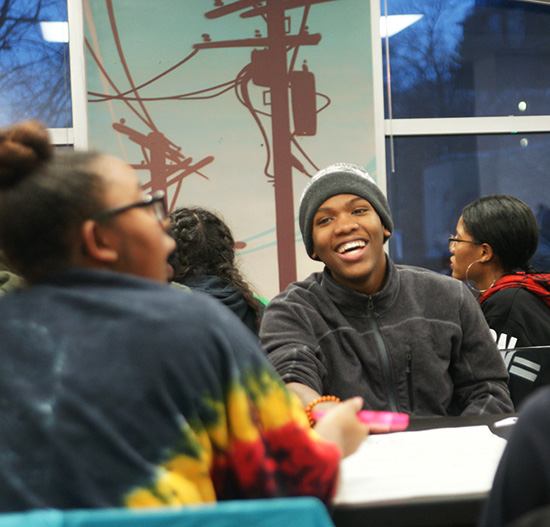
YWP is driven by results and tangible change in the lives of the youth we work with – and a responsibility to expand DC programs and policies to include the many thousands of youth with whom we don’t work. We are committed to assessing needs, designing responsive programs, utilizing evidenced-based models, creating and using best practices, and evaluating our work and impact on a weekly basis. YWP data collection and evaluation systems are organized into five tiers of outcomes: youth development (including peer educator development), youth leadership development, community impact-education and services (school-based health outcomes), and community impact-policy and advocacy. Our data collection and programming is guided by 20 development and impact goals.
YWP’s data collection and programming is guided by 20 development and impact goals.
Youth Development and Engagement Goals.
YWP builds teen leaders who:
- Have a strong self-concept, a powerful sense of their own worth and potential;
- Identify and work towards solving problems in their own lives;
- Value their opinions and speak assertively;
- Have information, knowledge, and understanding of larger social issues that have an impact on youth;
- Are setting and achieving goals: and improving their own lives
- Are able to build cooperative, supportive relationships
- Understand they can contribute to their communities and have impact;
- Understand how to navigate institutions, secure resources, and influence policy and decision making.
- Create and carry out projects and campaigns that challenge DC policies and institutions that affect youth.
- Create policies and improve institutions to improve the lives of youth.
Youth Leadership Goals
- Develop a city-wide cadre of 100 youth leaders who can develop and lead projects and campaigns, serve on working groups in the areas of child welfare, health, education, and employment.
- Develop a city-wide cadre of 400 youth educators in all wards, covering 90% of the enrolled youth high school population, who will provide essential health information, support, resources, and referrals.
- Build a city-wide membership of 1000 youth who will take action to expand rights and opportunities for DC youth.
Program Impact Goals
- Improve sexual health outcomes of DC youth ages 14-24 so that delay pregnancy, reduce STI and HIV rates, increase contraception-use rates, and practice healthy relationships. Through the Youth Health Educator Program (YHEP), YWP develop and implement a model peer health education program that employs youth part time to improve sexual health outcomes for youth. Each year, YHEP will conduct 50,000 educational interventions, distribute 80,000+ condoms, and refer 1000+ youth to school and community based clinics
- Improve health and wellbeing of DC public school youth ages 4-19 through the development and implementation of the 2016 Health Education Standards.
- Improve work readiness and job placement of DC youth ages 14-24 so that they can secure work and develop careers by increasing the number of in-school and out-of-school year-round placements (to 2000) and program quality. Develop the capacity to develop and implement model programs that employ youth, develop and pilot curricula, and inform the program approach and outcomes of DOES. Engage youth staff as advocates to improve DOES.
- Increase support and programming for foster youth (14-21) so that they are able to find jobs, complete high school and college, secure housing, and access system rights. Through the Foster Care Campaign, develop, support, engage 40 foster youth staff each year who will assess government services, conduct research, provide feedback and advocacy.
- Increase support and programming for youth who emancipate from CFSA (21-24) so that they are able to find work, continue educational progress, improve their health, secure housing, and build healthy relationships. Develop the capacity to develop and implement model program to build the capacity of and provide services to youth aging out of foster care in order to achieve the below outcomes. The model program will serve between 50-250 youth and will help to directly inform the program approach and outcomes of CFSA and other government agencies
- Increase engagement of youth in the electoral process by passing the Youth Voting Act, which lowers the voting age to 16. Build a coalition of national organizations, local youth, parents, and other supporters.
- Increase the visibility and effectiveness of youth leaders in shaping agency-level and legislative policy and implementation by catalyzing agency-level working groups and engaging youth in the oversight and budget processes.


